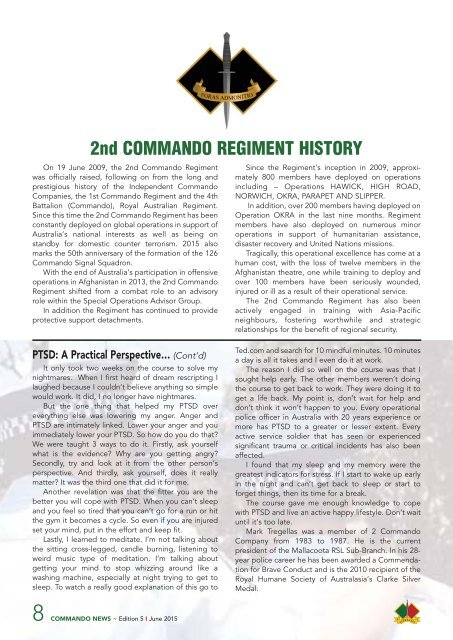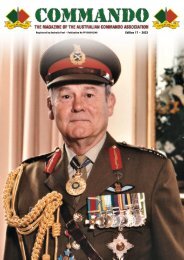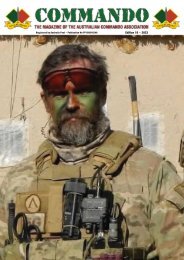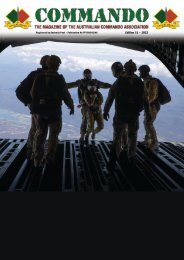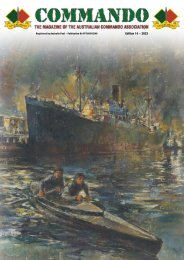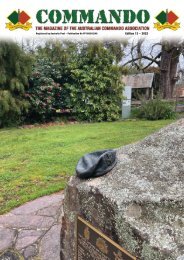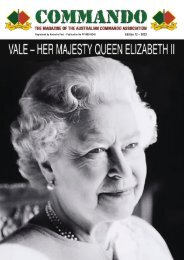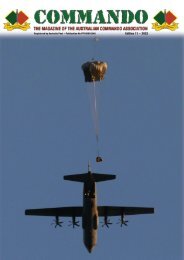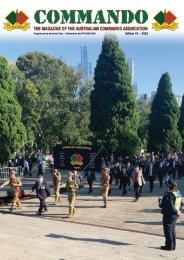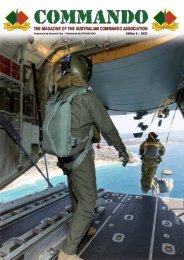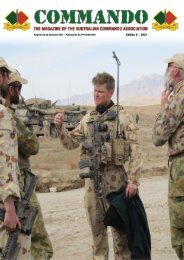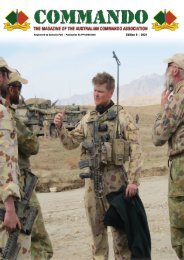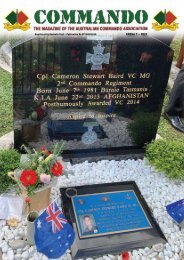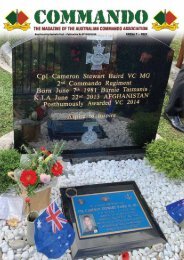AUSTRALIAN COMMANDO ASSN INC.
You also want an ePaper? Increase the reach of your titles
YUMPU automatically turns print PDFs into web optimized ePapers that Google loves.
2nd <strong>COMMANDO</strong> REGIMENT HISTORY<br />
On 19 June 2009, the 2nd Commando Regiment<br />
was officially raised, following on from the long and<br />
prestigious history of the Independent Commando<br />
Companies, the 1st Commando Regiment and the 4th<br />
Battalion (Commando), Royal Australian Regiment.<br />
Since this time the 2nd Commando Regiment has been<br />
constantly deployed on global operations in support of<br />
Australia’s national interests as well as being on<br />
standby for domestic counter terrorism. 2015 also<br />
marks the 50th anniversary of the formation of the 126<br />
Commando Signal Squadron.<br />
With the end of Australia’s participation in offensive<br />
operations in Afghanistan in 2013, the 2nd Commando<br />
Regiment shifted from a combat role to an advisory<br />
role within the Special Operations Advisor Group.<br />
In addition the Regiment has continued to provide<br />
protective support detachments.<br />
Since the Regiment's inception in 2009, approxi -<br />
mately 800 members have deployed on operations<br />
including – Operations HAWICK, HIGH ROAD,<br />
NORWICH, OKRA, PARAPET AND SLIPPER.<br />
In addition, over 200 members having deployed on<br />
Operation OKRA in the last nine months. Regiment<br />
members have also deployed on numerous minor<br />
operations in support of humanitarian assistance,<br />
disaster recovery and United Nations missions.<br />
Tragically, this operational excellence has come at a<br />
human cost, with the loss of twelve members in the<br />
Afghanistan theatre, one while training to deploy and<br />
over 100 members have been seriously wounded,<br />
injured or ill as a result of their operational service.<br />
The 2nd Commando Regiment has also been<br />
actively engaged in training with Asia-Pacific<br />
neighbours, fostering worthwhile and strategic<br />
relationships for the benefit of regional security.<br />
PTSD: A Practical Perspective… (Cont’d)<br />
It only took two weeks on the course to solve my<br />
nightmares. When I first heard of dream rescripting I<br />
laughed because I couldn’t believe anything so simple<br />
would work. It did, I no longer have nightmares.<br />
But the one thing that helped my PTSD over<br />
everything else was lowering my anger. Anger and<br />
PTSD are intimately linked. Lower your anger and you<br />
immediately lower your PTSD. So how do you do that?<br />
We were taught 3 ways to do it. Firstly, ask yourself<br />
what is the evidence? Why are you getting angry?<br />
Secondly, try and look at it from the other person’s<br />
perspective. And thirdly, ask yourself, does it really<br />
matter? It was the third one that did it for me.<br />
Another revelation was that the fitter you are the<br />
better you will cope with PTSD. When you can’t sleep<br />
and you feel so tired that you can’t go for a run or hit<br />
the gym it becomes a cycle. So even if you are injured<br />
set your mind, put in the effort and keep fit.<br />
Lastly, I learned to meditate. I’m not talking about<br />
the sitting cross-legged, candle burning, listening to<br />
weird music type of meditation. I’m talking about<br />
getting your mind to stop whizzing around like a<br />
washing machine, especially at night trying to get to<br />
sleep. To watch a really good explanation of this go to<br />
Ted.com and search for 10 mindful minutes. 10 minutes<br />
a day is all it takes and I even do it at work.<br />
The reason I did so well on the course was that I<br />
sought help early. The other members weren’t doing<br />
the course to get back to work. They were doing it to<br />
get a life back. My point is, don’t wait for help and<br />
don’t think it won’t happen to you. Every operational<br />
police officer in Australia with 20 years experience or<br />
more has PTSD to a greater or lesser extent. Every<br />
active service soldier that has seen or experienced<br />
significant trauma or critical incidents has also been<br />
affected.<br />
I found that my sleep and my memory were the<br />
greatest indicators for stress. If I start to wake up early<br />
in the night and can’t get back to sleep or start to<br />
forget things, then its time for a break.<br />
The course gave me enough knowledge to cope<br />
with PTSD and live an active happy lifestyle. Don’t wait<br />
until it’s too late.<br />
Mark Tregellas was a member of 2 Commando<br />
Company from 1983 to 1987. He is the current<br />
president of the Mallacoota RSL Sub-Branch. In his 28-<br />
year police career he has been awarded a Commenda -<br />
tion for Brave Conduct and is the 2010 recipient of the<br />
Royal Humane Society of Australasia’s Clarke Silver<br />
Medal.<br />
8 <strong>COMMANDO</strong> NEWS ~ Edition 5 I June 2015


